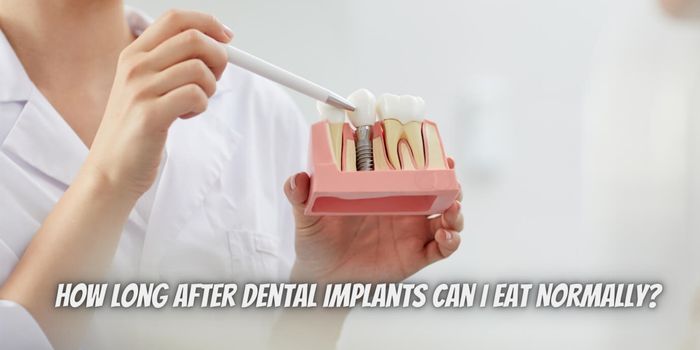How Long After Dental Implants Can I Eat Normally?

Dental implants are an innovative and highly effective method of restoring missing teeth. These surgically implanted prosthetic roots made of titanium serve as a solid foundation for dental restorations like crowns, bridges, or dentures. Having the right professionals to help you through this process is extremely crucial too. If you are looking for dental implants Honolulu and are contemplating dental surgery, read on because this article will answer some of your questions for sure.
Patients often ask questions about the healing period as well as whether they are able to return to their regular eating habits without experiencing any discomfort or dangers as dental implant operations continue to gain popularity. In this article, we’ll examine the main elements that affect when patients can resume regular meals after dental implant surgery.
Phases and Factors Post-Dental Surgery
- The Immediate Post-Surgery Period: Prioritizing adequate healing and rehabilitation after dental implant surgery is essential. The implant area may be painful and tender during this initial stage. As a result, it is advised to adhere to a soft-food diet for a few days to encourage healing and reduce irritation. Patients should choose soft foods instead of crunchy or firm items that could put undue strain on the surgical area, such as mashed potatoes, stews, yogurt, fruit smoothies, and scrambled eggs.
- The Osseointegration Phase: A vital phase in the dental implant process is the osseointegration stage. It involves the strong and stable bonding of the titanium implantation with the surrounding bone. Depending on the patient’s capacity for healing, general health, and density of the jawbone, this integration normally takes place over a time frame of 3 to 6 months. It is crucial to continue eating cautiously at this time.
- The Importance of Proper Oral Hygiene: Throughout the entire dental implant process, maintaining great oral hygiene practices is crucial. Cleaning and eliminating harmful microorganisms from the implant location will hasten recovery and lower the chance of infection. Dentists frequently provide patients with detailed advice on how to take care of the implant site. These instructions may include things like using a toothbrush with a soft bristle, refraining from aggressive scrubbing close to the area of surgery, and using antimicrobial mouthwashes.
- The Role of Temporary Prosthetics: Patients may occasionally get temporary prostheses while they’re going through the osseointegration process. While permanent replacements are being created, such temporary crowns or bridges serve both aesthetic and practical needs. Dentists could advise patients on what to eat during this time to keep their temporary prosthesis healthy and functioning.
- The Placement of Permanent Restorations: The dental implant is regarded as stable and prepared for the implantation of permanent restorations once osseointegration has been properly performed. Depending on the patient’s particular requirements, these may be dental crowns, bridges, or dentures. Permanent restorations can usually be fitted without much difficulty and without the need for further downtime or severe dietary adjustments.
- Gradual Progression to Normal Eating: Patients can progressively transition to a more diversified diet with a wider spectrum of textures and consistencies after the successful placement of permanent restorations. Most people discover that they may continue eating normally at this point without any difficulty. However, it is crucial to exercise caution, especially while eating foods that are hard or sticky, since they may put too much pressure on the implants.
- Maintaining Long-Term Oral Health: Dental implants must be prioritized for long-term oral health to preserve their lifespan, even after obtaining full capability. An effective implant maintenance routine must include a balanced diet, consistent dental exams, and cleaning procedures.
How Long After Dental Implants Can I Eat Normally?
It’s important to give the healing process and osseointegration enough time after receiving dental implants so that they can take effect. The implants typically need two to six months to properly combine with the jawbone. It’s crucial to carefully adhere to the dentist’s post-operative recommendations during this time to ensure a complete recovery. A soft or watery diet is advised at first to prevent placing too much exertion on the healing implants. Patients can progressively resume eating solid foods as time goes on and the implants are well implanted. Following the healing process, you can resume your normal eating habits with the added benefit of a completely functional and restored smile, just as they had before the implant treatment.
The length of time it takes to resume regular eating habits after receiving dental implants depends on a number of variables, including the healing process of the patient, the degree of osseointegration, and the kind of dental prosthesis utilized. After the permanent restorations have been placed, patients can usually continue eating normally.
However, the immediate post-surgery phase necessitates a soft-food diet to aid healing. For dental implants to last a long time, proper oral cleanliness and adherence to dentists’ recommendations are still crucial. Dental implants can give people who are missing teeth an effective and aesthetically acceptable option, enabling them to maintain a balanced diet for a long time to come. However, they must be properly taken care of.




